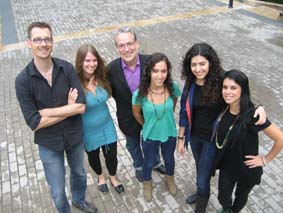
The Valencia Campus team, made up of students from Universitat de València and Universitat Politècnica de València, has been chosen to take part in an international competition of synthetic biology iGEM 2012. Multidisciplinar groups of students of many parts of the world are rivaling in these event. The Valencian students will take their Talking Life project, which has enabled them to establish a dialogue with living cells and which combines theory, experiments and bioethics debate.
This week, the students headed by the lecturer and researcher from Cavanilles Institute for Biodiversity and Evolution Biology at the Science Park Manel Porcar are going to travel to Amsterdam. There, the European stage of the competition will take place on October 6. The finals are going to be held in Massachussets (MIT) in Boston. This morning, the Office of the Principal has hosted the presentation of the the Valencia Biocampus team. The Vice-Principal for Sustainability, the Vice-Principal for Research and Scientific Policy, and the Principal’s Delegate for the Excellence Campus have attended the event.
Valencia Biocampus team is made up of twelve students supervised by twenty scientists and doctorate students. They have started a micro-sponsored web to collect funding and get sponsors. This way, they will be able to finance some aspects of the project like laboratory equipment. Any person can contribute to help them in exchange of something like a batch of UV’s publications.
DIALOGUE WITH BACTERIA
Is it posible to talk to a bacterium and get an answer? From this question, some students at UV and UPV have developed during the summer a research project which has taken them to the European stage of the international competition of synthetic biology iGEM, organized by the MIT in Boston.
The group designed and built an interspecific translation device, based on the light, which allows to literally talk with the microorganisms: human voice is encoded in form of light with a specific wave length, and some microbial proteins are excited by this light. They answer by emitting more light with a different wave length. This is transformed in a voice message that is heard through a regular loudspeaker. ‘We can make the bacteries answer some easy questions like for example: are your hot? or do you have enough oxygen?’, Manuel Porcar explains.
The project has completely new elements which can even be considered disturbing. That is why they wanted to carry out a study of the ethical aspects of synthetic biology. They have done this by shooting a film, Talking life. This film tries to open the debate with the public which will allow them to assess the advantages and risks of this technology.
The project, headed by Manel Porcar has the suport of the two public universities in Valencia and CSIC, but also the members of the VLC/CAMPUS, the Office of the Vice-Principal for Culture, the Chair for Science Dissemination, the Rector Peset Hall of Residence, the Universitat Publications Service, and the journal Mètode. Also the University of Bergen, the Research Council of Norway, the European project of synthetic biology ST-Flow and Biópolis SL, which a Science Park’s company, have wanted to collaborate.
Project's web site:
http://2012.igem.org/Team:Valencia_Biocampus
Web site of Talking Life:
http://www.youtube.com/watch?feature=player_embedded&v=PW4o7-V7KeY
MIcro-sponsored project web site:
http://www.indiegogo.com/vlcbiocampusIGEM
Last update: 1 de october de 2012 09:19.
News release



















